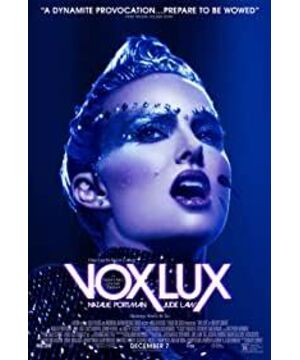In this film, the director tries to use the protagonist's personal experience to insinuate the mentality of the entire Western countries in the social environment of the new era. It is divided into four acts, from prologue to closing, to gradually deepen and reveal the theme.
First of all, in the prologue, the terrorist attack that the protagonist himself encountered in his childhood is quite meaningful in his performance. The director first described the extremely life-like daily campus scenes-the greetings between teachers and students after the holidays. Then, when the student armed with a gun entered the classroom, the director did not shoot the front of him, but always fixed the shot on the teacher, thus enhancing the suddenness of the shooting. This technique actually conveyed a message: the old life was shattered by terrorist attacks, and the Western world has entered a new era full of anxiety. It can be said that the prologue has become a foundation for the tone and theme of the whole film, and in subsequent films, the director will also take us into a new era.
In the first act, the director mainly expresses the psychological state of the protagonist after the terrorist attack, emphasizing a character who gradually deviates from the outside and the inside---she asks the agent not to speak swear words, but she is utterly desolate and eventually lost. The agent announced that "I don't believe you are a good girl anymore. I will start to talk swearing casually now." In the eyes of the agent, she seems to be a "child who is too young to face the risks of career", but in fact She can already accept this kind of negative information; she and her sister are dependent on each other, but eventually she feels betrayed because of her sister’s sex with her agent; she is actively resisting the public image of terrorism, but privately is obsessed with rock music. The extreme emotions are vented, and the experience of being deeply trapped in the terrorist attack cannot be relieved. In this passage, the director also repeatedly used family DV video + narration to alternate with this article: the former shows the protagonist's "deserved positive life", while the latter shows the protagonist's actual negative life. In this scene, the director also emphasized the "expectations of the outside world for the protagonist": in the paragraphs of the press conference, the director meaningfully gave the camera to the camera of the singing protagonist to convey the message: positive and go out Shadow, the protagonist's image is exactly what she is in the eyes of the outside world, and what others are looking forward to. On the other hand, in this scene, the protagonist also showed his response to such a public expectation: in the eyes of everyone’s expectations, the song she sang in the recording studio is hard to satisfy---this scene Ingeniously reveals a fact: the outside world needs and expects the protagonist to become a person who actively faces the unstable world, but the protagonist's heart has already run counter to this expectation. At the end of this chapter, the director finally throws out the last straw that bends her: the 9/11 incident --- in the second act after this incident, the protagonist began to be completely obscured and negative, so this incident was completely obscured and negative. It can be regarded as "the final blow to make the protagonist finally produce a qualitative change."
The result of the last blow brought by 911 was the second act. In the second act, the director focused on the difference between "she who is expected by the outside world" and "the actual she". In the beginning part, the director still used a terrorist attack to hint at the complete arrival of the new world opened by 9/11. In such a new world, the negative of the protagonist has also become dying. In this passage, the director repeatedly arranged various plots in a large amount, allowing the protagonist to switch between extreme negative emotions such as anger, perversion, grief, loss of control, etc., to show her negativity. In order to emphasize the connection between all these and the "terrorist attack", the director arranged the connection between the protagonist and the terrorist attack-the terrorists were wearing the masks in the protagonist's MV. Therefore, after the director’s suggestion, it can be said that the message conveyed in the first act has been expressed again: the gradual darkening of the protagonist’s life is brought about by the social state of the new world of terrorism. At the same time, the director also made a little clever design: the actor who played the protagonist's daughter was the protagonist in the first act, and the daughter was pregnant as early as the protagonist in the first act. This subtle overlap actually implies a cycle in the state of Western society: in such an uneasy social state, each generation of Westerners will cyclically follow the path of the protagonist's generation and gradually become negative. On the other hand, for the protagonist, the outside world still expects her to become an image that actively opposes terrorist attacks and embraces life as she did in the past-the protagonist’s colleagues hope that she can express protests against terrorist attacks in the press conference. In the face of this expectation, the protagonist also tried to cater to this expectation on the surface as in the first act, but the inner contradiction has been unstoppable, but in the second act, this situation becomes more obvious---the protagonist tries to Respond positively, but eventually you will fall into hysterical emotions. She is actually only a member of the social environment, and it is impossible to be independent from the influence of the social environment on the individual. This has already been hinted in a shot in the first act --- in the cold-toned high-rise building. Behind the camera, the protagonist and a group of three people shuttle between these tall buildings expressionlessly.
At the end, the director used a live concert of the protagonist to make some points. As a singer, the protagonist tried his best to perform on the stage, while the crowd shouted with excitement, and the protagonist’s sister and daughter also showed a consoling expression watching the performance. This scene actually aptly places the theme that the director wants to convey: as the general public, they hope to find a positive thing to give themselves hope, so that they can live in a new world full of anxiety and terror, but this way Positive things do not actually exist. What the public gets is an illusion that conceals the negative reality. A public figure like the protagonist is precisely such an existence. From a young age, she has carried the positive image of "resisting violence against terror" given by the outside world. However, she herself is just an ordinary member of this turbulent new world and can only interact with all others. Like the public, DOWN AND DOWN together. Natalie Portman's somewhat clumsy and lame stage performances may have been intentional or unintentional, which just improved the expression effect of this theme: from these clumsiness, we can see that she is only performing a kind of "in line with the expectations of the public." The image of ", rather than an absolute representation of the true self. It can be said that in this film, the director gives the protagonist a dual image and role: "She who the outside world expects" exposes the public's psychological desires, while "the real she" shows the mental state of an ordinary member of the public. In the last picture, the director also used a dazzling light to title "Sound of Light", once again showing the "protagonist in the eyes of the public" and the illusion expected by the public.
However, the problem with this film is also huge. Although the director tries to show the living conditions of Westerners in the era of terrorism, the ambition and perspective are very important, but from the perspective of the film, what is the exact impact on the social phenomenon of terrorism and the psychological changes of the general public? The expression is largely blank---except for the shooting directly on the protagonist at the beginning, all we get are the various terrorist incidents "as the background", but lack of "what kind of things it imposes on the characters." Influence and effect". This is particularly evident in the second act, which mainly hosts this content. In the first act, the director mainly shows the individual psychological state of "the protagonist after being shot", character description, which is obviously within his abilities. But in the second act, due to the director's ability-shooting level, insufficient research and understanding of the current social situation, etc., leading to the absence of important content, we always seem to be just looking at the protagonist’s various emotions, which affects and influences. Her mood is completely blank. The same problem caused the complete loosening of the structure in the second act of the film. Therefore, although the film has a good ambition and a clever idea, due to the director's own age, experience, and ability limitations, there are greater problems in expression, and the film is not ideal.
View more about Vox Lux reviews











